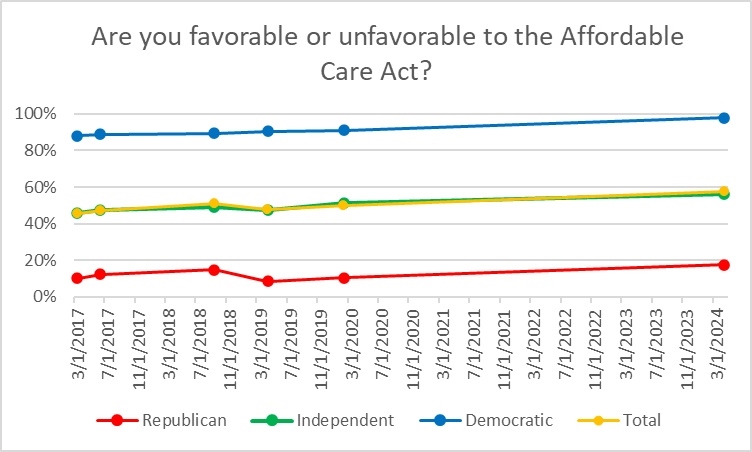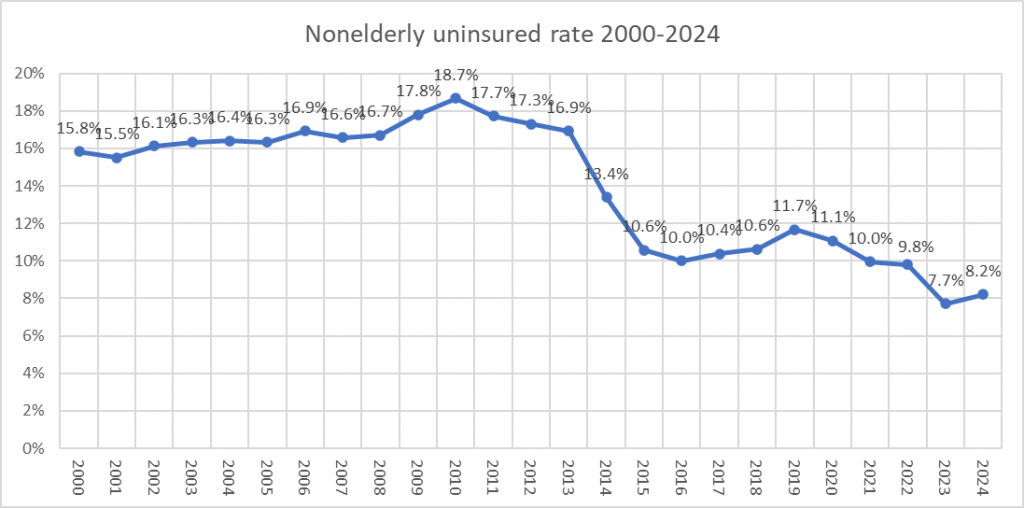Is It Finally Time For Wisconsin To Accept Medicaid Expansion Dollars?
And would Donald Trump reduce the number of uninsured people?

Ascension Columbia St. Mary’s Hospital in Milwaukee. File photo by. Coburn Dukehart / Wisconsin Watch
A recent report from the Wisconsin Policy Forum offers additional support for the proposition that Wisconsin should expand its Medicaid program.
Although the Forum insists that “as with all our reports, in this study we neither advocate for or against expanding Medicaid,” the facts offer compelling evidence that Medicaid expansion would be good for Medicaid recipients and for Wisconsin taxpayers.
In addition, the ACA incentivized states to expand Medicaid, so that it would be available for most residents whose income was below 138% of the poverty level. This incentive has two parts. First, the federal government would pay 90% of the cost of the expansion, rather than the lower share with those who qualified previously, currently 60.7%. In addition, the state would receive a one-time federal incentive payment of 5% for the initial two-year budget period.
Partially offsetting these additional federal payments, a shift from insurance purchased through the exchange to Medicaid would reduce the federal tax credits currently flowing to insurers in the state to subsidize health coverage.
The next graph summarizes the Forum’s estimate over a two-year budget cycle of the fiscal impact if Wisconsin chose to expand its Medicaid program to make it available to everyone whose income fell below 138% of the official poverty level. The first column shows the net effect of expanding Medicaid during the 2025-27 state budget cycle would be to provide a benefit to state taxpayers of just over $1.7 billion. The second column shows the estimate for following years, with a total net benefit of $480 million to Wisconsin taxpayers.
As the map below shows, Wisconsin is one of 10 remaining states that refuses to expand Medicaid. All but two of them are in the South. Despite having made the same decision to refuse Medicaid expansion, the outcome in the other nine non-expanding states has been quite different than in the Dairy State.
According to the Forum’s report, 4.9% of Wisconsin residents are uninsured, which puts it in tenth place among all fifty states. By contrast, none of the other non-expanding states has a rate below the national average of 7.9%, including Texas, whose rate is the highest nationally at more than 16%.
The advent of the ACA allowed the removal of residents whose income exceeded the poverty level. These people were expected to replace their insurance through the exchange. Their places were then taken by low-income people whose income was below the poverty line.
Ostensibly, there was no net cost to this shift. According to supporters of this strategy, the savings from moving individuals whose income was above the poverty line into the marketplace almost covered the cost of insuring poor people below the poverty line.
There was also a political motive. It allowed then-Governor Scott Walker, who was planning to run for president in 2016, to claim that he rejected Obamacare. The problem with this claim is that it ignores the fact that the plan was viable because the Obama exchanges were able to absorb the people who were thrown off of Medicaid because their income was above the poverty line. Without the Obamacare exchanges, the plan doesn’t work.
The next chart shows the response over time when the Marquette University Law School Poll asked Wisconsin voters whether they were favorable or unfavorable to the Affordable Care Act. The responses divide sharply along partisan lines.
Who would most benefit from expanding Medicaid in Wisconsin? The most obvious beneficiaries are Wisconsin taxpayers who would have their taxes reduced by over a billion dollars during the upcoming biennial budget cycle. Alternatively, the saving could be applied for other purposes, such as subsidizing childcare centers.
There would also be some benefits to recipients. Medicaid is free to the user. Although policies on the marketplaces are heavily subsidized for people just above the poverty level, they are not free.
The next graph shows the history of the number of people without medical insurance between 2000 and the first quarter of 2024. Prior to the passage of the ACA in 2010, the number of people with medical insurance was slowly shrinking, particularly in the individual market.
This decline seems to be due to the dynamic of the unregulated insurance industry. Consider the fate of several efforts to offer insurance to everyone, without regard to their previous medical experience. Competitors would find they could undercut the competition by combining lower prices with aggressive weeding out potential enrollees whose history suggested they would incur more medical costs. The result was a gradual downward spiral, as people with existing conditions found medical insurance either unaffordable or too expensive.
As mentioned, the ACA was passed in 2010 and took full effect in 2013. This led to a substantial decline in the number of people without insurance.
On the campaign trail, Donald Trump and JD Vance have claimed that Trump saved Obamacare. As can be seen in the graph below, this claim is not supported by the evidence. During Trump’s first three years in office, the number of Americans without health insurance increased by 4.6 million (16%),
During the current Biden administration, the number of uninsured people resumed shrinking. The apparent increase so far this year may reflect the phase out of some programs that were part of the effort to respond to the pandemic.
The question of the future of medical insurance may ride on the upcoming election. Nothing in Trump’s record gives confidence that the number of uninsured would decrease if he were elected.
If you think stories like this are important, become a member of Urban Milwaukee and help support real, independent journalism. Plus you get some cool added benefits.
Data Wonk
-
Life Expectancy in Wisconsin vs. Other States
 Dec 10th, 2025 by Bruce Thompson
Dec 10th, 2025 by Bruce Thompson
-
How Republicans Opened the Door To Redistricting
 Nov 26th, 2025 by Bruce Thompson
Nov 26th, 2025 by Bruce Thompson
-
The Connection Between Life Expectancy, Poverty and Partisanship
 Nov 21st, 2025 by Bruce Thompson
Nov 21st, 2025 by Bruce Thompson
























